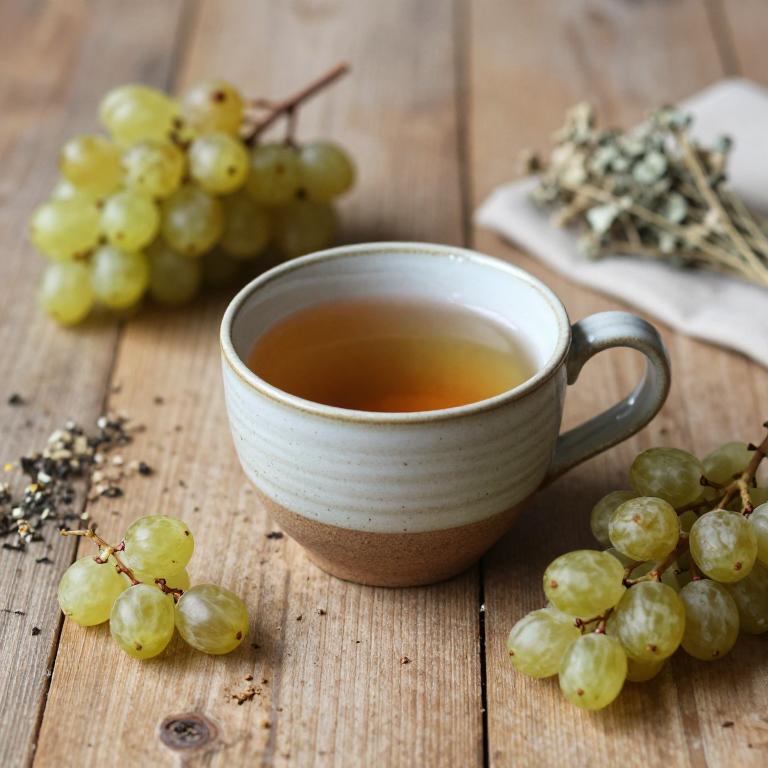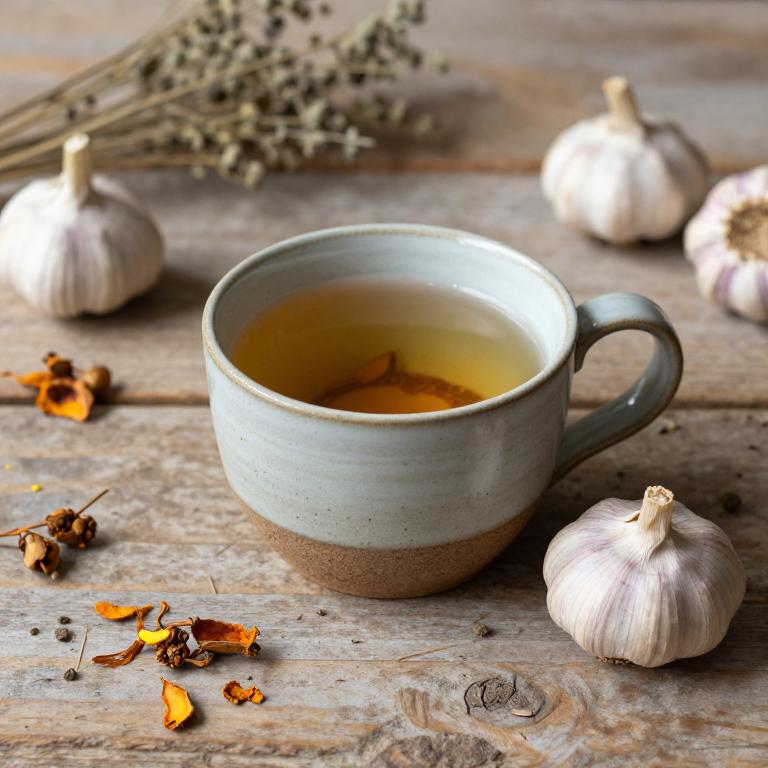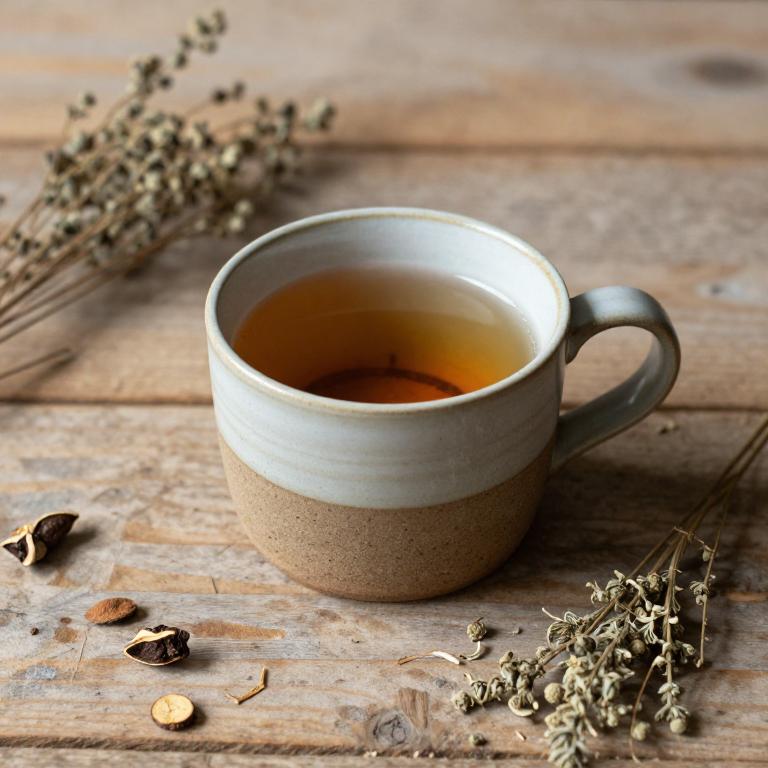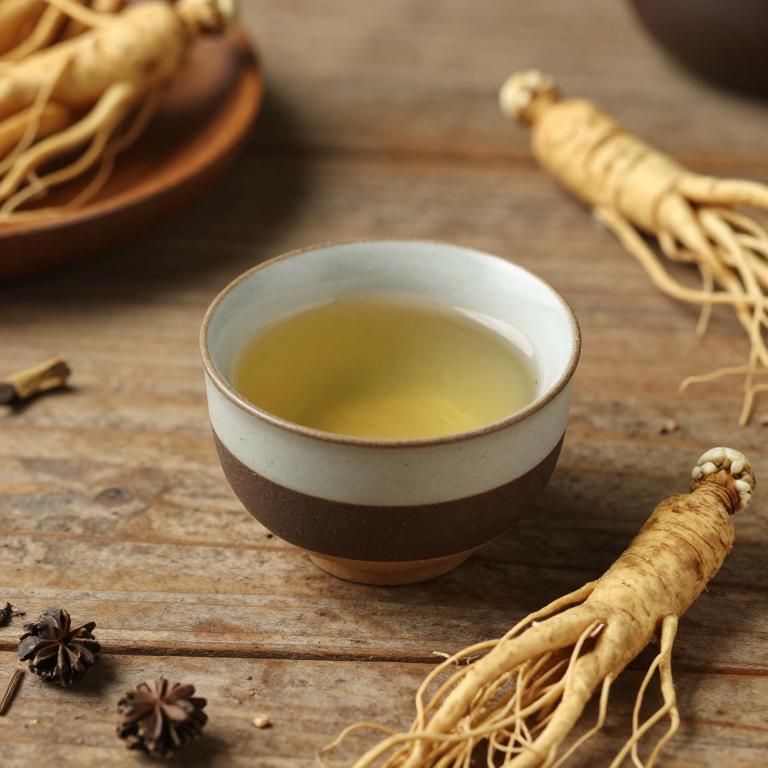10 Best Herbal Teas For High Cholesterol

Herbal teas have gained popularity as a natural alternative for managing high cholesterol levels.
Certain herbs, such as green tea, ginger, garlic, and hawthorn, are believed to support heart health by reducing LDL cholesterol and improving overall lipid profiles. These teas work by promoting healthy digestion, reducing inflammation, and enhancing metabolic function. Regular consumption of these herbal infusions may complement traditional treatments and contribute to better cardiovascular health.
However, it's important to consult with a healthcare provider before incorporating herbal teas into a cholesterol management plan.
Table of Contents
- 1. Salvia (Salvia officinalis)
- 2. Common grape (Vitis vinifera)
- 3. Garlic (Allium sativum)
- 4. Stinging nettle (Urtica dioica)
- 5. Thistle (Silybum marianum)
- 6. Ginger (Zingiber officinale)
- 7. Ceylon cinnamon (Cinnamomum verum)
- 8. Turmeric (Curcuma longa)
- 9. Blessed thistle (Cnicus benedictus)
- 10. Panax ginseng (Panax ginseng)
1. Salvia (Salvia officinalis)

Salvia officinalis, commonly known as sage, has been traditionally used in herbal medicine for its various health benefits, including its potential role in managing high cholesterol.
Research suggests that sage contains compounds such as flavonoids and polyphenols, which may help reduce LDL cholesterol levels and improve overall lipid profiles. When brewed into a herbal tea, sage can support cardiovascular health by promoting healthy cholesterol metabolism and reducing oxidative stress. Regular consumption of sage tea may contribute to lowering total cholesterol and triglycerides, though it should be used as a complementary therapy alongside a balanced diet and medical advice.
While more clinical studies are needed, sage tea is considered a natural and accessible option for those seeking to support heart health through herbal means.
2. Common grape (Vitis vinifera)

Vitis vinifera, commonly known as the common grapevine, is the source of many herbal teas that are believed to support cardiovascular health, including those aimed at managing high cholesterol.
These teas typically contain compounds such as resveratrol, which has been studied for its potential to reduce low-density lipoprotein (LDL) cholesterol levels. While some herbal teas made from Vitis vinifera may offer antioxidant and anti-inflammatory benefits, they are not a substitute for medical treatment or a balanced diet. It is important to consult with a healthcare professional before incorporating these teas into a cholesterol management plan.
Overall, Vitis vinifera herbal teas may complement a healthy lifestyle but should be used as part of a comprehensive approach to managing high cholesterol.
3. Garlic (Allium sativum)

Allium sativum, commonly known as garlic, has been traditionally used in herbal teas to support cardiovascular health, including the management of high cholesterol.
Garlic contains bioactive compounds such as allicin, which may help reduce low-density lipoprotein (LDL) cholesterol, often referred to as "bad" cholesterol. When consumed as a herbal tea, garlic can be prepared by steeping fresh or dried garlic cloves in hot water, allowing the beneficial compounds to be absorbed into the bloodstream. Studies suggest that regular consumption of garlic tea may contribute to lowering cholesterol levels and improving overall lipid profiles.
However, it is important to consult with a healthcare provider before using garlic tea as a supplement, especially for individuals with existing health conditions or those taking medication.
4. Stinging nettle (Urtica dioica)

Urtica dioica, commonly known as stinging nettle, has been traditionally used in herbal medicine for its potential health benefits, including supporting cardiovascular health.
When brewed into a tea, stinging nettle may help lower cholesterol levels due to its rich content of antioxidants, minerals, and bioactive compounds. Studies suggest that nettle tea may reduce low-density lipoprotein (LDL) cholesterol, often referred to as "bad" cholesterol, by promoting liver function and improving metabolic processes. However, while some preliminary research supports these claims, more clinical trials are needed to confirm its effectiveness for cholesterol management.
As with any herbal remedy, it is advisable to consult a healthcare professional before incorporating urtica dioica tea into a cholesterol-lowering regimen.
5. Thistle (Silybum marianum)

Silybum marianum, commonly known as milk thistle, is a herbal remedy that has been studied for its potential benefits in supporting liver health, which in turn can influence cholesterol levels.
While it is not a direct cholesterol-lowering agent, milk thistle may help improve overall liver function, aiding in the metabolism of lipids and potentially reducing harmful cholesterol levels. Some research suggests that the active compound silymarin in milk thistle may have antioxidant and anti-inflammatory properties that contribute to cardiovascular health. Herbal teas made from milk thistle are often consumed as a natural supplement to support detoxification and liver function.
However, it is important to consult with a healthcare provider before using milk thistle, especially for individuals with existing health conditions or those taking medications.
6. Ginger (Zingiber officinale)

Zingiber officinale, commonly known as ginger, is often used in herbal teas to support cardiovascular health, including the management of high cholesterol.
The active compounds in ginger, such as gingerol and shogaol, are believed to help reduce low-density lipoprotein (LDL) cholesterol levels, often referred to as "bad" cholesterol. Regular consumption of ginger tea may also improve blood circulation and reduce inflammation, which are key factors in maintaining healthy cholesterol levels. While ginger tea is generally safe and well-tolerated, it is advisable to consult a healthcare provider before using it as a supplement for cholesterol management.
Incorporating ginger into a balanced diet and lifestyle can be a natural and complementary approach to supporting heart health.
7. Ceylon cinnamon (Cinnamomum verum)

Cinnamomum verum, commonly known as true cinnamon, has been traditionally used in herbal teas to support heart health and manage high cholesterol levels.
The active compounds in cinnamon, such as cinnamaldehyde and polyphenols, are believed to help reduce low-density lipoprotein (LDL) cholesterol, often referred to as "bad" cholesterol. Regular consumption of cinnamon herbal tea may improve lipid profiles by increasing high-density lipoprotein (HDL) cholesterol, which is beneficial for cardiovascular health. However, it is important to consult with a healthcare professional before using cinnamon as a supplement, especially for individuals with diabetes or those taking medications.
While cinnamon tea can be a natural complement to a cholesterol-lowering diet, it should not replace prescribed medical treatments.
8. Turmeric (Curcuma longa)

Curcuma longa, commonly known as turmeric, is often used in herbal teas to support heart health, particularly in managing high cholesterol levels.
The active compound in turmeric, curcumin, has been studied for its potential to reduce low-density lipoprotein (LDL) cholesterol, often referred to as "bad" cholesterol, while also improving the levels of high-density lipoprotein (HDL) cholesterol, which is considered "good." These teas typically combine turmeric with other beneficial herbs like ginger, garlic, or black pepper to enhance absorption and overall effectiveness. Regular consumption of turmeric herbal tea may contribute to reducing inflammation and oxidative stress, both of which are linked to cardiovascular disease.
However, it is important to consult with a healthcare provider before using turmeric tea as a supplement, especially for individuals with existing health conditions or those taking medications.
9. Blessed thistle (Cnicus benedictus)

Cnicus benedictus, commonly known as St. Benedict's thistle, has been traditionally used in herbal medicine for its potential cardiovascular benefits.
Herbal teas made from this plant may help support healthy cholesterol levels by promoting the elimination of toxins and improving liver function, which plays a key role in cholesterol metabolism. Some studies suggest that compounds found in Cnicus benedictus may help reduce low-density lipoprotein (LDL) cholesterol, often referred to as "bad" cholesterol. While it is not a substitute for medical treatment, incorporating Cnicus benedictus herbal tea into a balanced diet and lifestyle may contribute to overall heart health.
As with any herbal remedy, it is advisable to consult with a healthcare professional before use, especially for individuals with existing health conditions or those taking medications.
10. Panax ginseng (Panax ginseng)

Panax ginseng, a popular adaptogenic herb, has been traditionally used to support overall health and vitality, and recent studies suggest it may also play a role in managing high cholesterol levels.
When consumed as a herbal tea, Panax ginseng is believed to help reduce low-density lipoprotein (LDL), often referred to as "bad" cholesterol, by improving lipid metabolism and enhancing antioxidant activity in the body. The active compounds in ginseng, known as ginsenosides, may contribute to these beneficial effects by reducing oxidative stress and inflammation, both of which are linked to cardiovascular disease. However, while some research indicates potential cholesterol-lowering benefits, more clinical trials are needed to confirm its efficacy and safety for long-term use.
As with any herbal supplement, it is advisable to consult a healthcare professional before incorporating Panax ginseng tea into a cholesterol management plan.